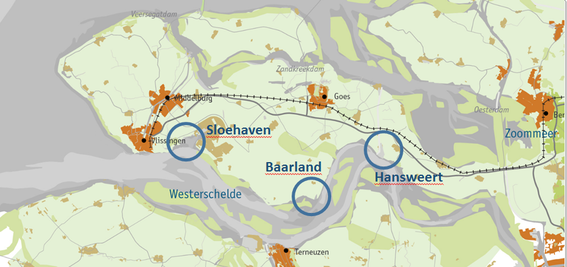Focus area and goal
We will focus on the northern shores of the Western Scheldt at the locations Sloehaven-west, Baarland and Hansweert (figure 1):
- In harbor Sloehaven-west, the Flemish-Dutch port authority North Sea Port is considering a port development and nature compensation at the location Shorerpolder;
- Near hamlet Baarland, municipality Borsele is initiating area development called Plan Plevier. NBS may provide opportunities for two local companies for recreation and water purification.
- At village Hansweert, the dike-renforement by Waterboard Scheldestromen requires extra space on both sides of the dike, i.e. in the village and nature conservation area in front of the coastal defence.
The general goal of the living lab is to accelerate the process of spatial planning and nature compensation along the estuary (faster) and to come up with multifunctional solutions that make a greater contribution to the natural capital and resilience of the estuary (more) than can be achieved with separate, sectoral solutions.
Goals of the research assignment
A group of approx. four students will work under the supervision of Delta Academy research group Building with Nature. The Master students will contribute to the general goal mentioned above and work on the following research assignments:
- Setting criteria for effective NBS so that we can test future changes against these criteria. What do we learn from previous NBS projects in the SW Delta and the North Sea region, is it really effective and why?
- Define ideal Nature-based solutions at the northern shore of the Western Scheldt between Vlissingen and Hansweert for each individual location and for a single large combination, using the criteria defined under 1 and the input of strategic developments (Natura 2000 goals, Nature compensation program Western Scheldt, VNSC Long term Vision on Natural Capital in the Western Scheldt-under development-). Investigate the appreciation by different stakeholders.
- Sketch the transition of natural capital in the Western Scheldt from current situation until 2030-2040, and make an estimation of its resilience to sea level rise and port development.
- Translate the ideal resilient future resulting from Nature-base solutions into actions needed today (back-casting). Analyze what this means to currently desired interventions in the Western Scheldt region.
Stakeholders involved
[names to be confirmed]
- Business: North Sea Port, Agriculture and Fishery firms; Staatsbosbeheer; Recreation sector:
- NGOs: Zeeuwse Milieu Federatie/ZmF; Natuurmonumenten; Vogelbescherming; WWF
- Community/households: Vlissingen, Ritthem, Baarland, Hansweert
- Government: Water board Scheldestromen; Rijkswaterstaat; Province of Zeeland; Municipality Vlissingen, Borsele, Hansweert
- Universities and research institutes: HZ, VHL, HR; Deltares, WMR, NIOZ; TU Delft, UU
Suggested literature
To execute the assignment it is required to have a good understanding of global, national and regional policies on ecosystem restoration and climate adaptation, knowledge of the delta base layer and basic principles of ecological engineering.
- Barbier, E. B., S. D. Hacker, C. Kennedy, E. W. Koch, A. C. Stier, and B. R. Silliman. 2011. The value of estuarine and coastal ecosystem services. Ecological Monographs 81:169-193. http://dx. doi.org/10.1890/10-1510.1
- Costanza, R., R. de Groot, P. Sutton, S. van der Ploeg, S. J. Anderson, I. Kubiszewski, S. Farber, and R. K. Turner. 2014. Changes in the global value of ecosystem services. Global Environmental Change 26:152-158. http://dx.doi.org/10.1016/j. gloenvcha.2014.04.002.
- Day J.W. et. al., 2016. Approaches to defining deltaic sustainability in the 21st century. Estuarine, Coastal and Shelf Science (2016). DOI: 10.1016/j.ecss.2016.06.018
- Rijkswaterstaat, Deltares, Ecoshape, 2013. Eco-engineering in the Netherlands. CD1013SB095.
- United Nations, 2018. Nature-based solutions for water. World water development report 2018.

